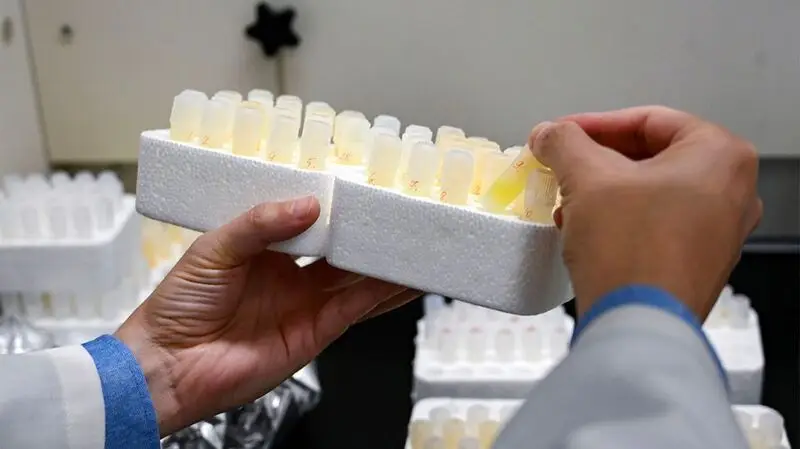
- Lithium is a mineral that can be found in nature, with small amounts also found in the human body.
- Past research has also shown that lithium seems to have a neuroprotective effect on the brain.
- A new study shows that lithium occurs naturally in the brain and plays a major role in normal brain function.
- Scientists also discovered that a loss of lithium in the brain may be an early warning sign for Alzheimer’s disease because it binds to beta-amyloid plaques.
Lithium is a mineral that can be found in nature. Very small amounts of lithium can also be found in the body by ingesting certain foods or drinking water with a high mineral content.
Because lithium is a mood stabilizer, it is sometimes used as a medication to treat mental health conditions like mania, bipolar disorder, and
Past research has also shown that lithium seems to have a
Now, a new study published in the journal
The study has shown, for the first time, that lithium occurs naturally in the brain and plays a major role in normal brain function.
Scientists also discovered that a loss of lithium in the brain may be an early warning sign for Alzheimer’s disease because it binds to
For this study, researchers used a combination of testing postmortem brain tissue and a mouse model of Alzheimer’s disease.
Using brain tissue samples from deceased participants with a mix of healthy cognition, mild cognitive impairment, and advanced Alzheimer’s disease, scientists discovered that of the 27 different trace metals in the brain, lithium was the only one that had significantly different levels across the groups.
Researchers found that changes to lithium amounts in the brain started at the earliest stages of memory loss, and levels of the mineral were very low in samples from participants with mild cognitive impairment or Alzheimer’s disease.
Next, the research team used a mouse model to further confirm their hypothesis. When healthy mice were fed a lithium-reduced diet, scientists found they aged more rapidly, and experienced brain inflammation and
In a mouse model of Alzheimer’s disease, scientists observed that lower lithium levels sped up the formation of amyloid-beta plaques and activated inflammatory cells called microglia in the brain.
However, when mice were provided with a lithium compound called lithium orotate, Alzheimer’s disease-related damage to the brain was reversed and memory function was restored.
“The idea that lithium deficiency could be a cause of Alzheimer’s disease is new and suggests a different therapeutic approach,” Bruce Yankner, MD, PhD, professor of genetics and neurology in the Blavatnik Institute at Harvard Medical School and senior author of this study, said in a press release.
“You have to be careful about extrapolating from mouse models, and you never know until you try it in a controlled human clinical trial,” Yankner cautioned, though he emphasized that “so far the results are very encouraging.”
“My hope is that lithium will do something more fundamental than
Manisha Parulekar, MD, FACP, AGSF, CMD, director of the Division of Geriatrics at Hackensack University Medical Center and co-director of the Center for Memory Loss and Brain Health at Hackensack University Medical Center, told Medical News Today that this discovery is significant because it offers a new way of looking at Alzheimer’s.
“For years, the fight against Alzheimer’s has been dominated by a single-target approach, focusing almost exclusively on clearing amyloid plaques,” Parulekar, who was not involved in this study, explained.
“But as dementia specialists, we know this is a multifaceted disease that affects the entire ecosystem of the brain. This study suggests a depletion of a natural element, and how restoring that balance could potentially impact all the major hallmarks of the disease — the plaques, the tangles, and cognitive function itself,” she added.
Parulekar said that these findings could potentially lead to new ways to both treat and detect Alzheimer’s disease, but in very different ways.
“Think of it like starting a healthy diet and exercise plan. If you start early, it can prevent heart disease. But even if you’ve already had a heart attack, starting that same healthy plan can still help you. It won’t undo the past damage, but it will make your body stronger and help slow down future problems. Similarly, lithium seems to make the brain healthier and more resilient. So, it could be used as a treatment to protect the brain cells that are still healthy and slow down the progression of the disease in people who already have it.”
– Manisha Parulekar, MD, FACP, AGSF, CMD
MNT also spoke to Peter Gliebus, MD, a neurologist, and director of cognitive and behavioral neurology at Marcus Neuroscience Institute, a part of Baptist Health South Florida, about this research.
Gliebus, who was not involved in the recent study, said his first reaction to its findings is one of cautious optimism.
“The study’s findings indicate that lithium exhibits a substantial impact on brain health and may mitigate the early molecular alterations associated with Alzheimer’s disease,” he said.
“The study underscores the potential of lithium replacement therapy as a preventive or therapeutic intervention. This discovery holds a promise as it presents novel avenues for addressing the disease at its earliest stages, potentially slowing or even halting its progression,” Gliebus explained.
“These findings have the potential to contribute to the early detection and treatment of Alzheimer’s disease in the future,” he continued. The study shows lithium deficiency as an early indicator of Alzheimer’s disease pathogenesis, potentially serving as a biomarker for early detection. Measuring lithium levels in the brain could enable the identification of individuals at higher risk of developing the disease.”
“Moreover, the therapeutic application of lithium orotate, which circumvents plaque sequestration, demonstrates promise in reversing or preventing pathological alterations in animal models,” Gliebus added. “If these findings are validated in human studies, lithium replacement therapy could emerge as a viable treatment option, particularly for individuals experiencing early cognitive decline or at elevated risk for Alzheimer’s disease.”





